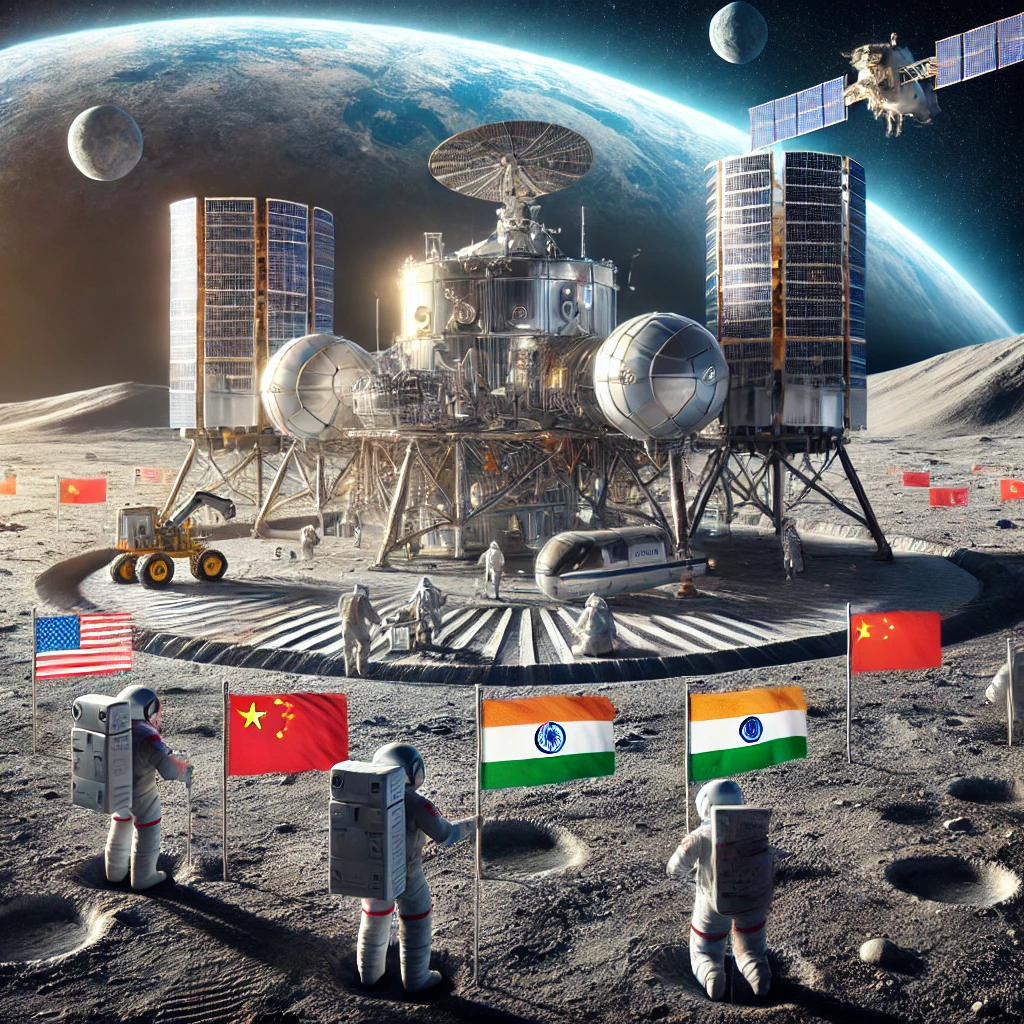Many countries and companies want to go to the Moon. China, India, Japan, and the US have all sent machines to the Moon. They want to build homes there. But, there are questions about who owns the Moon and its stuff. A 1967 rule says no one can own the Moon, but some people want to take and sell Moon things.
Water on the Moon is very important. It can be used for drinking, making air, and rocket fuel. The US wants new rules for exploring the Moon with the Artemis Accords. But, not everyone agrees on these rules. It’s important that everyone works together so the Moon stays a peaceful place for everyone.
Original news source: Who owns the Moon? A new space race means it could be up for grabs (BBC)
🎧 Listen:
Slow
Normal
Fast
📖 Vocabulary:
| 1 | countries | Places like the US, China, and India |
| 2 | companies | Groups of people who work together to make things or provide services |
| 3 | machines | Things made by people to do work, like robots |
| 4 | build | To make something by putting parts together |
| 5 | questions | Things you ask when you want to know more |
| 6 | rule | Something you must follow, like a law |
| 7 | important | Something that matters a lot |
| 8 | exploring | Looking around to find new things |
| 9 | agrees | When people think the same way about something |
| 10 | peaceful | Quiet and calm, without fighting |
Group or Classroom Activities
Warm-up Activities:
– Charades
Instructions: Divide the class into small groups. Give each group a set of vocabulary words related to the article (e.g. Moon, homes, water, rules, exploring). One person from each group will act out a word silently, while the rest of the group tries to guess what it is. The group that guesses correctly gets a point. Repeat with different members of each group taking turns.
– News Summary
Instructions: Read the article aloud to the class. Then, ask each student to write a one-sentence summary of the article. Have them share their summaries with a partner and compare. Finally, ask a few students to share their summaries with the whole class.
– Opinion Poll
Instructions: Write the following question on the board: “Do you think countries and companies should be allowed to own and sell Moon things?” Have students raise their hands to indicate their opinion (e.g. thumbs up for yes, thumbs down for no, thumbs sideways for unsure). Ask a few students to explain their reasoning for their opinion.
– Vocabulary Pictionary
Instructions: Divide the class into pairs. Give each pair a set of vocabulary words from the article. One student will draw a picture to represent a word, while the other student tries to guess what it is. They can also switch roles. Encourage students to use English words to describe the picture or guess.
– Speed Summarizing
Instructions: Write the following sentence starters on the board: “Many countries and companies want to go to the Moon because…” and “Some people think it’s important to have rules for exploring the Moon because…”. Divide the class into small groups. Each group will have a set amount of time (e.g. 2 minutes) to come up with as many reasons as possible to complete the sentence starters. The group with the most reasons wins.
🤔 Comprehension Questions:
1. Who wants to go to the Moon?
2. What do they want to build on the Moon?
3. Can anyone own the Moon?
4. Why is water important on the Moon?
5. What can water on the Moon be used for?
6. What are the Artemis Accords?
7. Why is it important for everyone to work together on the Moon?
Go to answers ⇩
🎧✍️ Listen and Fill in the Gaps:
Many countries and companies want to go to the (1)______. China, India, Japan, and the US have all (2)______ machines to the Moon. They want to build homes there. But, there are questions about who owns the Moon and its stuff. A 1967 rule says no one can own the Moon, but some people (3)______ to take and (4)______ Moon things.
Water on the Moon is very important. It can be used for drinking, (5)______ air, and rocket fuel. The US wants new rules for (6)______ the Moon with the Artemis Accords. But, not everyone agrees on these rules. It’s important that everyone (7)______ together so the Moon stays a peaceful (8)______ for everyone.
Go to answers ⇩
💬 Discussion Questions:
Students can ask a partner these questions, or discuss them as a group.
1. What is the Moon?
2. Do you think it would be fun to live on the Moon? Why or why not?
3. How would you feel if you could visit the Moon one day?
4. Do you like looking at the Moon in the night sky? Why or why not?
5. What do you think is special about the Moon?
6. How would you feel if someone tried to sell things from the Moon?
7. Do you think it’s fair that no one can own the Moon? Why or why not?
8. What do you think would happen if different countries fought over who owns the Moon?
9. How important do you think water is on the Moon? Why or why not?
10. How would you feel if you found water on the Moon?
11. Do you think it’s a good idea for everyone to work together to keep the Moon peaceful? Why or why not?
12. What do you think the Moon would be like if people started living there?
Individual Activities
📖💭 Vocabulary Meanings:
Match each word to its meaning.
Words:
1. countries
2. companies
3. machines
4. build
5. questions
6. rule
7. important
8. exploring
9. agrees
10. peaceful
Meanings:
(A) Something you must follow, like a law
(B) Something that matters a lot
(C) Quiet and calm, without fighting
(D) Things made by people to do work, like robots
(E) When people think the same way about something
(F) Places like the US, China, and India
(G) Looking around to find new things
(H) Things you ask when you want to know more
(I) To make something by putting parts together
(J) Groups of people who work together to make things or provide services
Go to answers ⇩
🔡 Multiple Choice Questions:
1. Who wants to go to the Moon?
(a) China, India, Japan, and the US
(b) France, Germany, Spain, and Italy
(c) Australia, Brazil, Canada, and Mexico
(d) Russia, South Africa, Egypt, and Nigeria
2. What do they want to build on the Moon?
(a) Schools
(b) Restaurants
(c) Parks
(d) Homes
3. What is the rule about owning the Moon?
(a) China owns the Moon
(b) No one can own the Moon
(c) The US owns the Moon
(d) Everyone can own the Moon
4. Why is water on the Moon important?
(a) It can be used for cooking, cleaning, and gardening
(b) It can be used for playing, swimming, and fishing
(c) It can be used for sleeping, reading, and watching TV
(d) It can be used for drinking, making air, and rocket fuel
5. What are the new rules called for exploring the Moon?
(a) The Moon Rules
(b) The Artemis Accords
(c) The Lunar Laws
(d) The Space Regulations
6. What does everyone need to do to keep the Moon peaceful?
(a) Work together
(b) Fight each other
(c) Steal from each other
(d) Ignore each other
7. Who has already sent machines to the Moon?
(a) France, Germany, Spain, and Italy
(b) Australia, Brazil, Canada, and Mexico
(c) China, India, Japan, and the US
(d) Russia, South Africa, Egypt, and Nigeria
8. What can water on the Moon be used for?
(a) Playing, swimming, and fishing
(b) Cooking, cleaning, and gardening
(c) Drinking, making air, and rocket fuel
(d) Sleeping, reading, and watching TV
Go to answers ⇩
🕵️ True or False Questions:
1. The Moon should stay a peaceful place for everyone.
2. It’s unimportant for everyone to work together.
3. Water on the Moon is important for drinking, making air, and rocket fuel.
4. Few countries and companies want to go to the Moon.
5. The US does not want new rules for exploring the Moon.
6. China, India, Japan, and the US have sent machines to the Moon.
7. Some people want to take and sell Moon things.
8. Not everyone disagrees on these rules.
Go to answers ⇩
📝 Write a Summary:
Write a summary of this news article in two sentences.
Check your writing now with the best free AI for English writing!
Writing Questions:
Answer the following questions. Write as much as you can for each answer.
Check your answers with our free English writing assistant!
1. Who wants to go to the Moon?
2. What do they want to build on the Moon?
3. What is the rule about owning the Moon?
4. Why is water on the Moon important?
5. Why is it important for everyone to work together on the Moon?
✅ Answers
🤔✅ Comprehension Question Answers:
1. Who wants to go to the Moon?
China, India, Japan, and the US want to go to the Moon.
2. What do they want to build on the Moon?
They want to build homes on the Moon.
3. Can anyone own the Moon?
No, nobody can own the Moon.
4. Why is water important on the Moon?
Water is important on the Moon because it can be used for drinking, making air, and rocket fuel.
5. What can water on the Moon be used for?
Water on the Moon can be used for drinking, making air, and rocket fuel.
6. What are the Artemis Accords?
The Artemis Accords are new rules for exploring the Moon.
7. Why is it important for everyone to work together on the Moon?
It is important for everyone to work together on the Moon so that it stays a peaceful place for everyone.
Go back to questions ⇧
🎧✍️✅ Listen and Fill in the Gaps Answers:
(1) Moon
(2) sent
(3) want
(4) sell
(5) making
(6) exploring
(7) works
(8) place
Go back to questions ⇧
📖💭✅ Vocabulary Meanings Answers:
1. countries
Answer: (F) Places like the US, China, and India
2. companies
Answer: (J) Groups of people who work together to make things or provide services
3. machines
Answer: (D) Things made by people to do work, like robots
4. build
Answer: (I) To make something by putting parts together
5. questions
Answer: (H) Things you ask when you want to know more
6. rule
Answer: (A) Something you must follow, like a law
7. important
Answer: (B) Something that matters a lot
8. exploring
Answer: (G) Looking around to find new things
9. agrees
Answer: (E) When people think the same way about something
10. peaceful
Answer: (C) Quiet and calm, without fighting
Go back to questions ⇧
🔡✅ Multiple Choice Answers:
1. Who wants to go to the Moon?
Answer: (a) China, India, Japan, and the US
2. What do they want to build on the Moon?
Answer: (d) Homes
3. What is the rule about owning the Moon?
Answer: (b) No one can own the Moon
4. Why is water on the Moon important?
Answer: (d) It can be used for drinking, making air, and rocket fuel
5. What are the new rules called for exploring the Moon?
Answer: (b) The Artemis Accords
6. What does everyone need to do to keep the Moon peaceful?
Answer: (a) Work together
7. Who has already sent machines to the Moon?
Answer: (c) China, India, Japan, and the US
8. What can water on the Moon be used for?
Answer: (c) Drinking, making air, and rocket fuel
Go back to questions ⇧
🕵️✅ True or False Answers:
1. The Moon should stay a peaceful place for everyone. (Answer: True)
2. It’s unimportant for everyone to work together. (Answer: False)
3. Water on the Moon is important for drinking, making air, and rocket fuel. (Answer: True)
4. Few countries and companies want to go to the Moon. (Answer: False)
5. The US does not want new rules for exploring the Moon. (Answer: False)
6. China, India, Japan, and the US have sent machines to the Moon. (Answer: True)
7. Some people want to take and sell Moon things. (Answer: True)
8. Not everyone disagrees on these rules. (Answer: False)
Go back to questions ⇧















